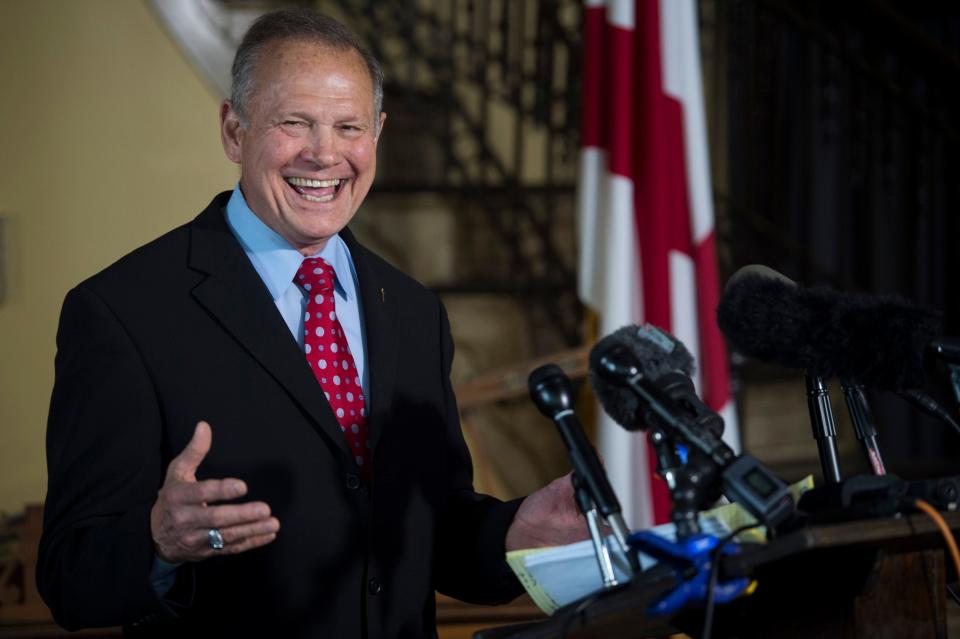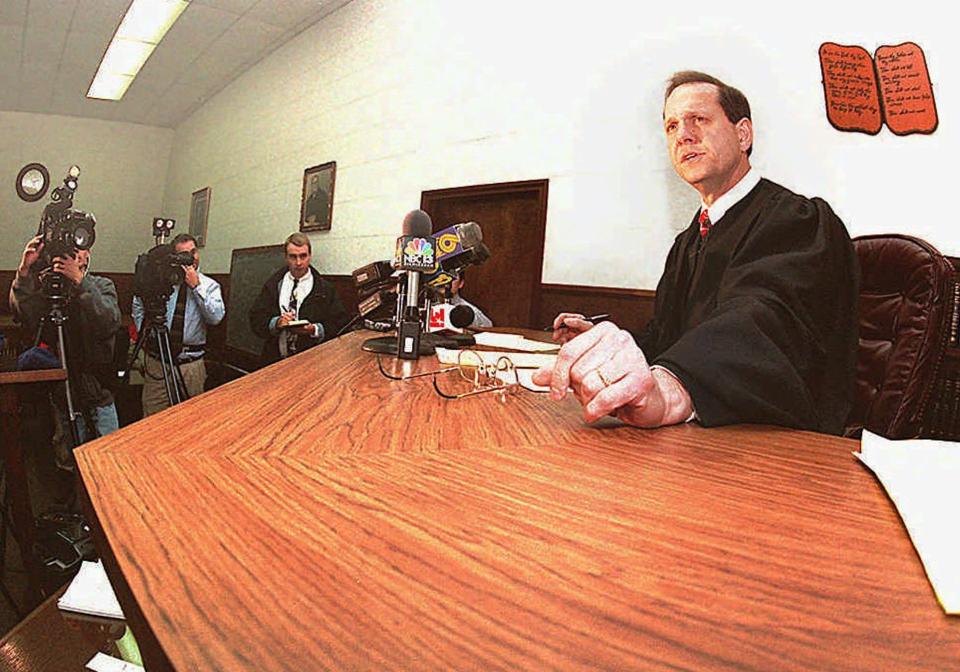Timeline: Roy Moore's political career, legal challenges over the years
- Oops!Something went wrong.Please try again later.
Former Alabama Chief Justice Roy Moore is in the courtroom once again, this time in connection with defamation lawsuits brought on by sexual assault allegations raised during the 2017 U.S. Senate election.
Leigh Corfman was the first to raise sexual assault allegations against Roy Moore during his candidacy for U.S. Senate. She told the Washington Post she was 14 in 1979 when Moore, then 32 and working as a prosecutor, pursued and molested her. The accusation became news a month before Moore, the Republican nominee for the Senate, faced Democratic nominee Doug Jones in a special election for the seat.
At least eight women have accused Moore of inappropriate conduct. Months after Corfman sued Moore for defamation, he countersued.
During his time in the public eye, Moore has been no stranger to lawsuits or controversy. Over the years, he's been removed from his position as Chief Justice twice: Once over a Ten Commandments monument installed at the State Capitol, the second time because of his orders against issuing same-sex marriage licenses in Alabama.
Here's a brief history of Roy Moore's most notable moments.
2022: Defamation trials over sexual abuse allegations that arose in 2017

Leigh Corfman, one of Moore's sexual abuse accusers, filed a lawsuit in early 2018 against Moore and his Senate campaign committee, saying they defamed her when they denied the accusation and said she was lying. Corfman demanded that Moore and the campaign retract and apologize for the statements she says are defamatory.
Before filing the lawsuit, Corfman sent a letter to Moore asking him to stop denying the sexual abuse, according to court records.
A couple of months after Corfman filed her lawsuit, Moore countersued, accusing Corfman of making "slanderous" and "libelous" statements to the Washington Post.
In July 2019, Circuit Judge Albert Johnson ruled that Moore's counterclaim of defamation would be put on hold until Corfman's case is resolved. Since then, the courts decided both cases would be heard at the same time.
More: Dueling defamation lawsuits against Roy Moore, Leigh Corfman go to trial in Montgomery
More: Three things to know about the defamation trial against Roy Moore, Leigh Corfman
'Impugned my veracity': Leigh Corfman takes stand in defamation case against Roy Moore
2020: Second attempt at U.S. Senate race

Roy Moore announced in June 2019 that he'd once again run for U.S. Senate during the 2020 election cycle.
During his campaign, in which he struggled to gain traction, he re-installed the Ten Commandments monument — it led to his first ouster as chief justice in 2003 — at his Foundation for Moral Law office in downtown Montgomery.
Moore received less than 8% of the vote during the March 3, 2020, primary, which set up a runoff between former Auburn head football coach Tommy Tuberville and former Sen. Jeff Sessions. Tuberville ultimately won election to the U.S. Senate.
2018: 'Who is America?' TV show targets Moore, other politicians

In the wake of the 2017 Senate election and sexual assault allegations, Moore found himself in the crosshairs of Sasha Baron Cohen's Showtime TV series, "Who is America?"
In a statement posted on Facebook, Moore said he accepted an all-expenses trip to Washington in February 2018 after being told he'd receive an award for supporting Israel. He says he didn't know Baron Cohen would mock Israel and scheme to humiliate him and other conservatives such as Sarah Palin and Dick Cheney.
The episode of the show featuring Moore aired in July 2018.
Moore filed a $95 million defamation lawsuit over his appearance on the program, which was later tossed out by a federal judge.
Life in wartime: Roy Moore fights battles — and often goes looking for them
2017: U.S. Senate candidacy, during which sexual assault allegations surface
When Sen. Jeff Sessions was tapped to serve as U.S. Attorney General by then-President Donald Trump, state Attorney General Luther Strange was appointed by Gov. Robert Bentley to fill the position until the 2018 General Election.
After Bentley resigned his position as governor in April 2017 under a cloud of scandal, Gov. Kay Ivey called for a special election to be held in December 2017.
Moore announced his intention to run for the Senate seat in late April 2017, and defeated incumbent Sen. Luther Strange in a Republican primary runoff vote in September 2017.
A month prior to the election, four women told the Washington Post that Moore pursued relationships with them while they were teenagers in the late 1970s and early 1980s.
Leigh Corfman said she was 14 when Moore, then 32, had sexual contact with her. Moore was serving as assistant district attorney for Etowah County at the time.
Moore denied the allegations and questioned the timing and motives of the report.
Ultimately, Democratic candidate Doug Jones defeated Moore in a closely won race, becoming the state's first Democratic U.S. senator in 25 years.
Moore filed a lawsuit to challenge the Senate election results, which was unsuccessful.
Moore allegations: Officials react to Roy Moore allegations
'Much ado about very little': Allegations against Roy Moore met with skepticism
Moore accusers: A breakdown of accusations against Senate nominee Roy Moore
2016: Ethics trial and second removal from office
The Southern Poverty Law Center filed an ethics complaint to the state’s judicial inquiry commission in 2015 after Moore publicly criticized a federal judge’s ruling overturning Alabama’s same-sex marriage ban, according to the Associated Press. The advocacy group filed a supplement to that complaint after Moore’s administrative orders to probate judges.
Moore argued that he never told judges to disobey a court order but pointed out that a previous state court order not to issue same-sex marriage licenses had not been lifted.
The Alabama Court of the Judiciary on Sept. 30, 2016, suspended Moore from his office as Alabama Supreme Court Chief Justice without pay for the remaining 26 months of his term. He appealed the suspension, which the Alabama Supreme Court upheld.
2015-16: Same-sex marriage battle
Same-sex couples began to get married in Alabama in February 2015 after U.S. District Judge Callie Granade ruled that the state's ban on same-sex marriages was unconstitutional the previous month.
Prior to Granade's order going into effect Feb. 9, Moore advised probate judges that they weren't required to issue marriage licenses to same-sex couples, arguing that the judge's decision wasn't binding on them.
The Alabama Supreme Court ordered state probate judges to stop issuing marriage licenses to same-sex couples in March 2015 as it considered an emergency request to stop same-sex weddings brought by the Alabama Policy Institute and the Alabama Citizens Action Program.
In June 2015, the U.S. Supreme Court ruled that same-sex marriage was legal in Obergefell v. Hodges. Granade cited the Supreme Court decision in permanently barring Alabama from enforcing laws that ban same-sex marriage.
On Jan. 6, 2016, Moore sent an administrative order telling probate judges not to issue marriage licenses to same-sex couples.
“Until further decision by the Alabama Supreme Court, the existing orders of the Alabama Supreme Court that Alabama probate judges have a ministerial duty not to issue any marriage license contrary to the Alabama Sanctity of Marriage Amendment or the Alabama Marriage Protection Act remain in full force and effect,” the order said, in bolded text.
2012: Elected as Chief Justice second time
Roy Moore announced on Nov. 22, 2011 that he'd be pursuing his old job as Chief Justice of the state Supreme Court.
“I have no plans to bring the monument or anything back,” Moore said after announcing he will seek the Republican nomination. “That monument’s got a home and I’m not going to move it.”
Moore narrowly defeated Democratic challenger and Jefferson County Circuit Judge Robert Vance Jr. with 52% of the vote to Vance's 48%.
He was sworn into office for the second time on Jan. 11, 2013.
2011: Moore forming presidential exploratory committee
2010: Second try at governor's office
Four years after his previous unsuccessful attempt to take over the governor's mansion, Moore announced his candidacy for a second time on June 1, 2009.
Moore placed fourth in a crowded Republican primary with 19.31% of the votes. Then-Rep. Robert Bentley and Bradley Byrne faced off in the runoff, with Bentley eventually winning the governorship against Democratic challenger Ron Sparks.
2006: First gubernatorial campaign

After nearly three years out of office, Moore announced in October 2005 that he would seek the Republican nominator for governor with a promise to "return Alabama to the people."
Moore received only 36% of the vote in the June 2006 Republican primary to incumbent Gov. Bob Riley's 64%. Riley went on to defeat Democratic candidate and his former lieutenant governor Lucy Baxley and served as governor until 2011.
2003: Removed from office over ethics violations

Despite U.S. District Judge Myron Thompson's order in November 2002, Moore refused to budge on removing the Ten Commandments monument from the Alabama Judicial Building in Montgomery.
An ethics complaint was filed against Moore and the state's Judicial Inquiry Commission suspended Moore for his refusal to comply with the federal order in August 2003.
Moore was removed from office by the judicial ethics panel in November 2003. Moore appealed his removal, which was upheld by a special supreme court in April 2004.
2001: Elected as Alabama Chief Justice, Ten Commandments monument controversy

Moore took office as Alabama's 28th Supreme Court Chief Justice on Jan. 15, 2001. He promised to "acknowledge God" in his new role.
That acknowledgement came in the form of a 5,280-pound monument of the Ten Commandments installed in the Supreme Court rotunda at the Alabama Supreme Court Building in Montgomery in August 2001, six months into his tenure.
Two lawsuits were filed in October 2001 seeking removal of the statue. The suit argued that the monument promoted the judge's conservative Christian faith in violation of the Constitution's ban on government establishment of religion. It was installed at night last year without other justices being given advance notice.
The chief justice testified during the trial that the commandments are the moral foundation of American law.
U.S. District Judge Myron Thompson ruled in November 2002 that the monument went too far in promoting religion, and ordered that it be removed within 30 days.
After legal challenges played out, the monument was removed in 2003. The U.S. Supreme Court declined to hear an appeal on the case.
1992-95: 'Ten Commandments Judge' plaque controversy in Etowah County

Moore was appointed as Etowah County circuit judge by then-Gov. Guy Hunt in 1992. He later won a full term, becoming the first Republican judge elected in Etowah County.
The controversy surrounded a wood carving of the Ten Commandments that hung in his courtroom. The Montgomery Advertiser on June 15, 1995, reported that Moore explained the plaque "represents the foundation of our law and government."
The American Civil Liberties Union of Alabama, alongside the Alabama Freethought Association and three Etowah County residents, filed a lawsuit in March 1995 to ban Moore's display of the Ten Commandments in his Etowah County courtroom, as well as to stop judges from opening court with prayer.
Montgomery Circuit Judge Charles Price ruled Nov. 22, 1996 that the Ten Commandments plaque does not promote religion and was not in violation of the law. However, Price also issued an order barring judges for arranging or conducting prayer in the state's courts, according to Montgomery Advertiser archives. That motion was later blocked by the Alabama Supreme Court.
In December 1996, the ACLU filed a motion asking Price to reconsider the case. Price visited the courtroom in February 1997 and later that month ruled that the Ten Commandments display in question did promote religion and must be altered if it were to remain in the courtroom. Montgomery Advertiser archives from Feb. 11, 1997, reported that Price's ruling stipulated it would need to be moved to another wall, placed in a larger display with nonreligious or historical items.
Montgomery Advertiser reporters Brian Lyman and Kirsten Fiscus, Montgomery Advertiser archives and the Associated Press contributed to this report.
This article originally appeared on Montgomery Advertiser: Roy Moore: 'Ten Commandments Judge' political career, legal challenges

